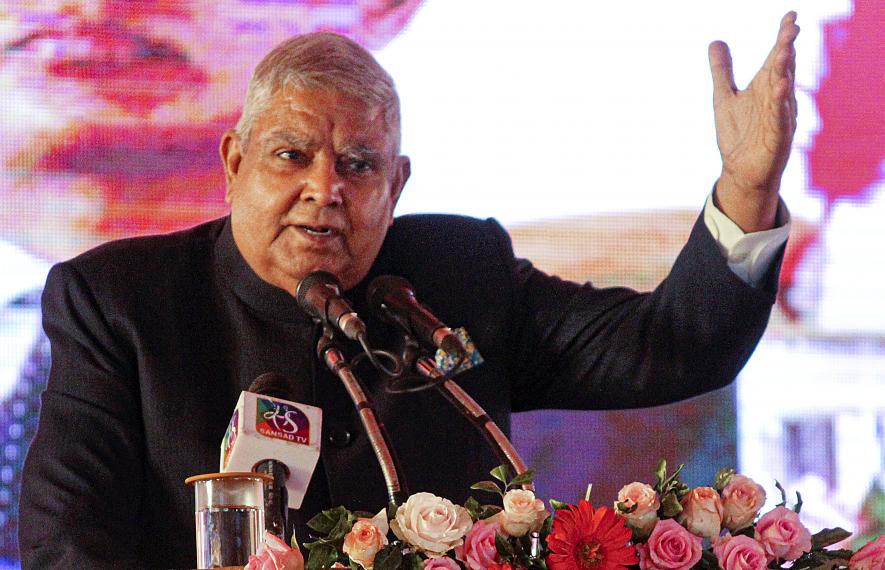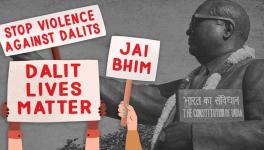Dhankhar’s Diatribes Question Fundamentals Evolved Over Decades

Vice President Jagdeep Dhankhar addresses at the unveiling ceremony of the statue of Kotwal Dhansingh Gurjar, at the Police Training School in Meerut, Saturday, March 11, 2023. Image Courtesy: PTI
Article 63 of the Constitution states prosaically, “There shall be a Vice President of India.” None of the subsequent Articles running till 71 specify that the V-P must act and behave in a non-partisan manner while holding office.
Yet it is understood—not merely because of convention—that every person holding the second highest constitutional office must act dignifiedly and not politically regardless of past political association and current opinion. The standard dictum is that conduct in office should not reflect the person’s political beliefs.
Constitutional authorities, especially the top two citizens of the country, must be miserly with their opinion and generous with acts that uphold constitutional principles. The capacity to secure the respect of political leaders, especially those in the Opposition, should be intrinsic in them.
To earn this, a modicum of separation is required between the person’s assertions and that of the ruling party. Unlike the Prime Minister (PM) or other ministers, for the President and V-P, a distinction cannot be made between a ‘political statement’ and a government ‘policy declaration’.
The responsibility is particularly grave for the V-P because she/he is also the Presiding Officer of the Rajya Sabha. That office must be seen as impartial because this impacts the global image of India’s Parliament.
The line of separation between the offices of the President and V-P on the one hand and that of the government or the ruling party on the other began blurring in 2017 when the terms of Pranab Mukherjee and Hamid Ansari.
But none of the occupants of the two offices have acted like active rabble-rousers and tried to outdo top guns of the ruling party over who can be more acerbic like the current V-P Jagdeep Dhankhar has.
Every political leader in the country, especially those from the Bharatiya Janata Party (BJP), is well within their rights to be extremely critical of former Congress president Rahul Gandhi for alleging during his contentious visit to the UK that microphones are switched off in Parliament to prevent opposition leaders from criticising the government.
But by taking up cudgels against the Congress leader, in a manner and style not much different from mid-level leaders or spokespersons of the BJP who make shrill statements in the hope of catching the attention of senior leaders, Dhankhar has greatly diminished the esteem of the office he holds.
It is understandable in the era of personalisation of politics that PM Narendra Modi and his colleagues habitually depict all criticism of himself, the government or the party as seditious acts which ‘target’ and ‘weaken’ the nation.
But it is unbecoming for the V-P to instigate people to “speak out against ‘these elements’ who ‘defame’ India and disrupt Parliament arguing that popular intervention alone can bring them to heel”.
Dhankhar’s statement was effectively a call for vigilante action—more problematic because it was made at an official function at an educational institute, Chowdhary Charan Singh University, Meerut.
There was no ambiguity over what he was imploring the people to do with his assertion: “Only people’s intervention can bring these elements on the right path.” One shudders at the imagination of the ‘right path’ he indicated.
With Dhankhar’s elevation, is there no distinction left between the motivational guru of a vigilante group and the V-P?
There can be a legitimate viewpoint that Dhankhar’s call for people to act against Rahul can eventually enable him to turn the victimhood card on Modi and the BJP.
Eventually, instead of earning kudos from Modi and his team, Dhankhar risks ending up with a collection of brickbats. But that would not neutralise the damage already done to the balance between various constitutional offices and wings of the State.
But more worryingly, since his elevation to the office in last August, Dhankhar has in an orchestrated manner gone about heaping humiliation on other wings of the State and India’s sacrosanct constitutional principles and traditions.
He has, in fact, questionably partnered with Union law minister Kiren Rijiju to launch a fusillade of accusations against the judiciary, specifically the Supreme Court (SC).
The attack has been mounted on two most important issues that enable the highest court to function the way its role was envisaged in the Constitution: the power to recommend appointment of Judges to the higher courts and the capacity to scrutinise laws passed by lawmakers or Parliament and scrutinise their constitutional validity.
It would be worthwhile examining why Dhankhar was selected for the post even though he was not homegrown within the Sangh Parivar but was instead a lateral entry after having grazed on other political pastures that enabled him also to secure a ministerial stint at the Centre during the coalition era.
Clearly, the government had found M Venkaiah Naidu less effective in reining the Opposition in the Rajya Sabha. Dhankhar’s candidature last year had the stamp of Modi all the way.
He was ‘rewarded’ because of setting the Raj Bhawan on a head-on collision course with West Bengal chief minister Mamata Banerjee after the 2019 Lok Sabha election.
Significantly, after Dhankhar was nominated as the ruling party’s candidate for the vice-presidency, Modi pointed to his “excellent knowledge” of the Constitution besides also stating that he was “well-versed with legislative affairs.”
In the last three-and-a-half months, we have had a glimpse of his skills on legislative and constitutional issues.
It all began with the annual LM Singhvi memorial lecture in early December when he virtually criticised Parliament and lawmakers of the two Houses for failing to raise even a “whisper” of protest at the apex court striking down the law establishing the National Judicial Appointment Commission.
Within days, he again attacked the SC Collegium System in his maiden address to the Rajya Sabha which should be interpreted as his statement of intent over the five years that he will be V-P and the House’s Chairperson. His statement became more worrisome because it sounded as the other ‘instrument’ of a coordinated jugalbandi with Rijiju, who also criticised the Collegium System for being opaque and not being sufficiently accountable.
His assertion in the House, that “here is no parallel to such a development in democratic history where a duly legitimised constitutional prescription has been judicially undone”, is highly contentious and cannot be considered as ‘right’ or ‘correct’.
Dhankhar’s pomposity knew no bounds in his claim that “on such momentous issue, so vital to democratic fabric, there has been no focus in the Parliament now for over seven years.” Evidently, he was trying to impress Modi by indicating that he had every intention to dwarf the judiciary as far as its role in scrutinising laws passed by Parliament was concerned.
In several statements made over the past three months, Dhankhar has repeated these assertions while advocating for the supremacy of the elected representatives over other wings of the State. He almost told Judges that their opinion mattered less because they were not elected.
In Dhankhar’s opinion, people must come to terms with the tyranny of those who have a mandate however feeble it may be on the basis of popular vote.
The V-P has also opened another broadside—seeking to erase the idea of basic structure of the Constitution being un-amendable. This concept, evolved by the SC in its verdict on the landmark Kesavananda Bharti case in April 1973, was attacked and Dhankhar said that there was “no such thing” as the basic structure.
The manner in which he presided over the Rajya Sabha during the Winter Session and the first half of the Budget Session and the open call for public action against Rahul have to be seen in conjunction with the attacks on independence of judiciary and fundamental constitutional principles and make Dhankhar a big threat to India’s institutional framework.
What makes these interventions and assaults more insidious is that these are couched in constitutional and legalistic vocabulary making them appear as the truth to the naive.
Furthermore, these attacks are not being made by ruling party leaders during TV debates and election meetings but in all seriousness by a person holding a constitutional office.
The V-P’s every diatribe has thereby to be analysed on its own and also in conjunction with other statements questioning the fundamentals on which a consensus has been evolved over decades.
The writer is a NCR-based author and journalist. His latest book is ‘The Demolition and the Verdict: Ayodhya and the Project to Reconfigure India’. He has also written the books ‘The RSS: Icons of the Indian Right’ and ‘Narendra Modi: The Man, The Times’. He tweets at @NilanjanUdwin)
Get the latest reports & analysis with people's perspective on Protests, movements & deep analytical videos, discussions of the current affairs in your Telegram app. Subscribe to NewsClick's Telegram channel & get Real-Time updates on stories, as they get published on our website.
























